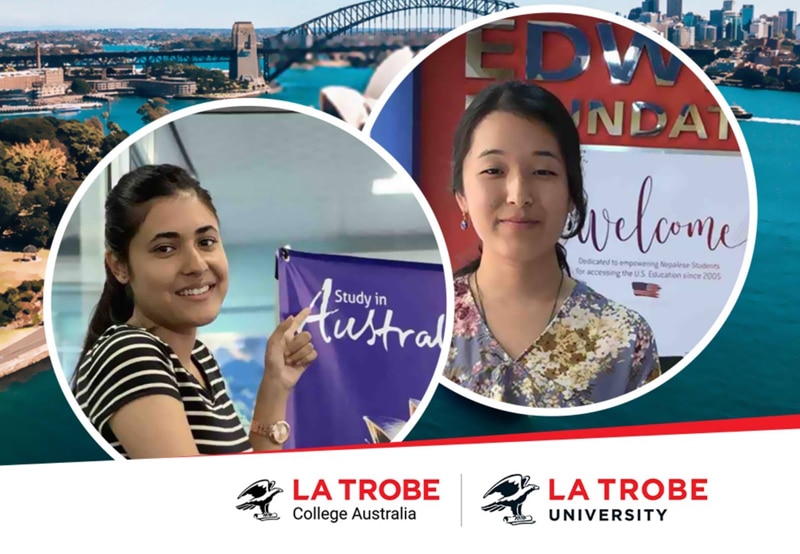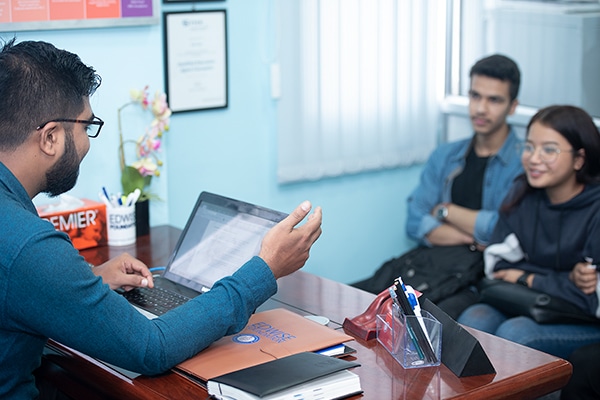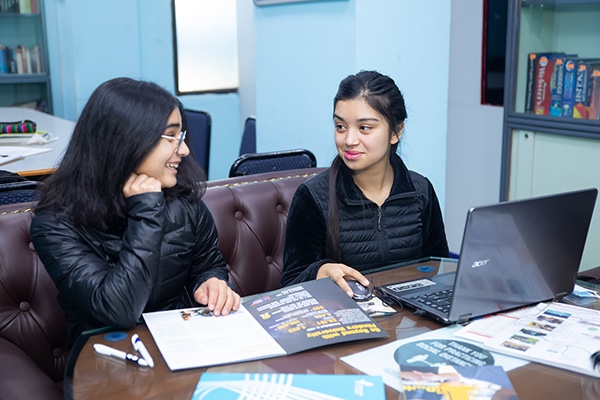Quick Navigation
- Highly-Experienced and Certified Consultants
- 15-Year Experienced IELTS Instructors
- Suggestions to Students
- Top Reasons for Nepalese Students to consider Aussie Education
- Australian Education System
- Popular courses
- Intakes
- English Language Proficiency Requirement
- Genuine Temporary Entrant (GTE) Requirement
- Cost of Attendance
- Part – Time Work
- Accommodation
- Visa Conditions
- Post Study Work (PSW) Visa

With Edwise, your favorite Education Consultancy in Kathmandu, Nepal for Australia, you can explore all possible academic opportunities that would lead you to a secured future. Along with skillful counselors, our Australia Studies Department vows to give students the best service in terms of college/university’s application, statement of purpose (SoP) and other paper works. From the top universities to reasonable costing colleges, we have always kept the need of clients the topmost priority ever since the establishment. So, what are you waiting for?
Study in Australia From Nepal
With years and years of experiences, our Education Consultancy in Nepal for Australia is providing the best service where you will have no complaints. You might have questions, such as; “What should I study?”, “Which program is best for me?” and “Which college or university is the best option for me?” in your mind.
- If you are clueless about the college application process, scholarship options and visa process for Australia, then we are here for students rescue with a team of experienced guidance counselors who can show the path for your successful study abroad and future career ahead.
- Edwise Foundation has been recruiting students to international destinations for higher education since 2005. And, since the beginning we have always believed in choosing the right match for our students- best institution and best courses that you deserve. Also, we know what kind of college, institution or university you are looking for- Reputed, Trustable and Affordable.
- At Edwise we exactly know what is best for you; we know what your priorities are; and we know what benefits you the most. Let our experts help you achieve your goal of studying in Australia from Nepal.
Highly-Experienced and Certified Consultants
Our counselors are QEAC certified years experienced education agents including Mr. B M Khadka (QEAC- N769) and Mr. Kiran Khatiwoda an Australian University graduate with years of experience in recruiting students to various colleges and universities in Australia. We are there to help students from initial counseling to parking your bags in Australia. Not to mention, we provide one of the nation’s best IELTS preparation classes to help students achieve the highest possible scores in IELTS. This helps them fulfill their dreams to study in Australia from Nepal.
15-Year Experienced IELTS Instructors
Along with experienced guidance counsellors, our consultancy also provides the facility of test preparation classes for students seeking to score high on IELTS. With highly professional instructors who hold decades of experience in preparing students for the IELTS, we are the proud holder of the great test result of our former students. Our IELTS classes are reasonably affordable, but the quality of classes are way above an average education consultancy in Kathmandu for Australia.
We make sure students are well taken care of. We help students get prepared with multiple MOCK TESTS and their feedbacks so that students understand what their weaknesses are and how to fix them.

Students should keep certain things in their mind such as: the consultancy’s networks of educational institutions abroad, which college/universities are they willing to work for, their visa rate, their qualification or competencies, counselor’s experience and certification and their services.
Scholarship for International Students in Australia
Edwise Foundation, an Education Consultancy in Kathmandu, Nepal for Australia, assures students a large network of college/universities (ready to recruit students to any preferable education provider), high visa success rate. Our best support is for trouble-free and error-free application processing.
Say goodbye to the hectic application process and consult Edwise foundation education consultancy in Nepal for Australia for your application process for studying in Australia.
Suggestions to Students From Nepal
There are thousands of consultancies in the country and finding the right consultancy can be an arduous journey. We have always encouraged students to explore more and learn from more; however, how do you find the right consultancy and choose the right guidance counselor for you?
Today, Australia is considered to be one of the most popular destinations for international education amongst Nepalese students. A degree earned in Australian University is very well recognized all around the world and recently seven of their universities have been listed amongst the Top 100 in the QS World University rankings 2018. Falling under one of the strongest education systems with technological drive an Australian institution offers ample of courses and degrees to cater international students. These institutions provide excellent educational services and facilities with strict quality standards that meet the needs of the students. Moreover, laws like Tuition Protection service (TPS) provide tuition fee safeguards to international students.
Most importantly, for international students, Australia now offers additional years of Post Study Work (PSW), to the students in regional areas. Students who graduate and meet the criteria of PSW from regional areas can now get up to 4 years of PSW. Ask a counselor at Edwise Foundation, who studied in Australia how a PSW actually works and what are the advantages or disadvantages of regional areas or non-regional cities.
Top Reasons for Nepalese Students to Consider Aussie Education
Australia is one of the most popular international education destinations for Nepalese students seeking education abroad. The country is known for its vibrant nature. With a warm welcome, the nation provides a huge opportunity to experience cultural diversity and quality education along with high standard of living, in a safe and sound environment. Out of the finest cities in world, five major cities which offer students an experience of greatest cities along with affordability lie in Australia.

Australian Educational System
Australia offers wide range of study opportunity for an international student with 1,200 institutions and 22,000 courses. The Education Services for Overseas Students (ESOS) Act 2000 is an Australian Government act that controls the delivery of international education in Australia. In the same way, the quality maintenance under Commonwealth Register of Institutions and Courses for Overseas Students (CRISOS) ensures that the international students acquire same standard of education like Australians do from the universities and other educational institutes.
Vocational Education and Training (VET)
Registered Training Organizations (RTOs), Technical and Further Education (TAFE) institutes and some private colleges offers Vocational education and training (VET) courses to cater students so that they can develop skill and knowledge for a specific employment opportunity they want to get into.VET courses cover wide range of courses including hospitality and tourism, construction and engineering, secretarial skills, visual arts, information technology, accounting, nursing and community work.
Australian VET Qualifications:
The VET sectors offer eight qualifications and with their course length as listed below.| Certificate I | 3-6 Months |
| Certification II & III | 6-12 Months |
| Certificate IV | 1 year |
| Diploma | 1-2 Years |
| Advanced Diploma | 2-2.5 Years |
| Vocational Graduate Certificate | 6 Months |
| Vocational Graduate Diploma | 1-1.5 Years |
Higher Education in Australia
Currently, there are 41 Australian universities, of which 3 are private (Bond, Torrens and Notre Dame) along with Carnegie Mellon, a US based university and University College London, a UK based university both of those international universities have their campuses in Adelaide, South Australia.
Australian universities along with other higher education providers offer a broad range of programs and courses which include science, humanities, management, health, engineering and law just to name a few. With well designed multi disciplinary courses along with personnel care and graduate employability, Australian institutions position themselves amongst the world’s finest institution.
– Hospitality and Tourism
– Business and Accountancy
– Health Science
– Nursing and Midwifery
– Digital Media and Information Technology
– Science and Engineering
– Education and Teaching
– Humanities and Social Work
– Music and Creative Arts
– Justice and Law
– Marine and Environmental Science and some pathway programs
| Bachelor’s | 3 Years (Min) |
| Bachelor’s Degree (Honors) | 4 years |
| Graduate Certificate | 6 Months |
| Graduate Diploma | 12 Months |
| Master’s Degree (course work) | 1-2 years |
| Master’s Degree (Research)- MPhil | 1-2 Years |
| Doctoral Degree | 3 Years |
Popular Courses and Course Duration For Students
At the moment, Australian institutes offer more than 120 courses under English language for an international student. Some of the popular courses are listed below:
Intakes For Nepalese students
Generally, Australian education providers have two intakes- 1st Semester on Feb and March, and 2nd Semester on June, July and August; however, some education providers may have trimester systems and their intakes are Feb, July and November. VET providers usually have intakes in every two months.
English Language Proficiency Requirement
An International student must meet English language proficiency requirement to get entry to their desired courses. Following are the major English language proficiency tests being accepted for course enrollment and visa application:
– International English Language Testing System (IELTS)
– Test of English as a Foreign Language (TOEFL)
– Pearson Test of English (PTE) Academic
– Cambridge English: Advanced (CAE)
The entry requirement is differed between education providers. Some of the courses like Nursing, Law or Education tend to have higher requirement. For those who are unable to meet the requirement for the desired courses, they have English Language Intensive Courses for Overseas Students (ELICOS) as an option as a pathway.
Exemptions:
There are exemptions for this requirement to present an English test score for the following students:
1. ELICOS, Schools, Secondary Exchange and Postgraduate Research Students
2. Students who have successfully completed, in the two years prior to student visa application, the requirements for a Senior Secondary Certificate
of Education, in a course that was conducted in Australia in English; or
Students who have successfully completed, in the two years prior to student visa application, a substantial component of a course leading to a qualification from the Australian Qualifications Framework at the Certificate IV level or higher that was conducted in Australia in English while the applicant was holding a student visa.
3. Foreign Affairs and Defense sponsored students
4. Students who are citizens of, and holds a valid passport issued by:
United Kingdom, United States of America, New Zealand, Canada, Ireland
5. Study of more than five years in English in one or more of the following countries:
Australia, United Kingdom, United States of America, New Zealand, Canada, Ireland, South Africa
Genuine Temporary Entrant (GTE) Requirement
The key requirement for an international student in order to convince the Department of Immigration and Border Protection in granting a student visa is to qualify as a Genuine Temporary Entrant. It basically requires student to show their genuine interest being study and have clear intention of returning home country once completed their studies.
Some of the factors that the department considers as part of GTE requirement for international students include:
- Circumstances in the applicant’s home country
- Applicant’s immigration history
- Applicant’s potential circumstances in Australia
- In case the applicant is a minor- the intentions of a parents, legal guardian or in case married – intentions of the applicant’s spouse
- The value of the course to the applicant’s future
- Other relevant conditions to the applicant’s intention to depart Australia after completion of studies

The Cost of Studying in Australia
The key requirement for an international student in order to convince the Department of Immigration and Border Protection in granting a student visa is to qualify as a Genuine Temporary Entrant. It basically requires student to show their genuine interest being study and have clear intention of returning home country once completed their studies.
Some of the factors that the department considers as part of GTE requirement for international students include:
- Circumstances in the applicant’s home country
- Applicant’s immigration history
- Applicant’s potential circumstances in Australia
- In case the applicant is a minor- the intentions of a parents, legal guardian or in case married – intentions of the applicant’s spouse
- The value of the course to the applicant’s future
- Other relevant conditions to the applicant’s intention to depart Australia after completion of studies
Cost of Living in Australia
As per the Australian Department of Home Affairs, the minimum amount required to cover living costs for one year is –
– Student/ Guardian – AUD 21,041
– Partner/ Spouse – AUD 7,362
– Child – AUD 3,152
Part – Time Work in Australia
Australian student visa allows international students to work up to 40 hours per fortnight and full time during session break. Students studying a Master by research or Doctorate (PhD) can work boundless hours once they have begun their course allowing them to gain valuable work experience in their field of interest.
Accommodation in Australia
In Australia, international students have various accommodation options, some of which are listed Accommodation
On-Campus Accommodation
Most of the Australian education providers offer halls of residence. This option provides students with safe and worriless environment so they can focus solely into their studies. Such residences are quite affordable; however, the costs vary with institutions they attend.
Off-Campus Accommodation
The international students can stay at private rental houses or flats. Normally, students might need to pay rent in advance with security deposit to stay in such accommodations.
Welfare arrangement for student under 18
For the student under 18 years old, education provider of Australia will arrange appropriate accommodation until the point when they will turn 18.
Additionally, those students can nominate any of their relatives over 21 year old as a local guardian having visa to remain in Australia at least for the period of time until student will turn 18.
Visa Conditions
The student must maintain enrolment in a full-time registered course that provides a qualification at the same or higher level than the course which the visa was granted to, and satisfy their provider’s requirements for attendance and course progress.
The student must maintain adequate health insurance during the time they are in Australia.
The student’s must continue to satisfy the requirements for the grant of the student visa. For example, a student must continue to have sufficient financial funds to support their study and stay in Australia.
The student visa holder must maintain adequate arrangements for the education of any school-age dependent who is in Australia for more than 3 months.
If the student is under 18, he or she must maintain welfare arrangements with either a parent, close relative or legal custodian or if welfare is approved through the education provider the education provider must approve arrangements including when arrangements change.
The student must keep the education institution informed of their current address in Australia. They have 7 days to notify them of any changes.
The student will not be eligible to lodge a new visa application in Australia and must return to their home country first, unless exceptional circumstances apply.
The student will not be eligible to lodge a new visa application in Australia and must return to their home country, unless the applicant gives evidence, in writing, that the Commonwealth or the government of the foreign country, as the case requires, does not oppose the applicant undertaking a further course of study.
The student cannot work more than 40 hours per fortnight when their course is in session (other than work which has been registered as a part of the course). No work limits apply during recognized periods of vacation offered by the education provider. No work limits apply for Postgraduate Research students (subclass 574) once their course has commenced.
The student’s family member, who was included in the primary applicant’s (i.e. student visa holder) application and was granted a visa, can work up to 40 hours per fortnight.
Post Study Work (PSW) Visa
Temporary Graduate visa (subclass 485) Post-Study Work stream which is commonly known as Post Study Work (PSW) Visa is a visa for those international students who recently graduated with an Australian degree. This visa allows you to work full time in Australia temporarily.
To be eligible for PSW Visa a student must have completed ‘eligible qualifications’ which are:
– a Bachelor’s or Bachelor’s (honors) degree or
– a Master’s or Master’s by Research degree or
– a Doctoral (PhD) degree
and have at least two years of academic study completed in Australia in Bachelor’s level study or higher (i.e. Bachelor’s, Master’s or PhD level)
Duration of Post Study Work Visa
The duration of your PSW Visa will vary according to the type of course you graduated with.
– A graduate with a Bachelor’s or Master’s degree by coursework will be eligible for a two-year Post Study Work Visa.
– A graduate with Master’s by research will be eligible for a three years PSW Visa and
– A graduate with a Doctoral degree will be eligible for a four years PSW Visa.
The changes in Post Study Work Visa in Australia
Australian government made some changes to its PSW Visa which has been implemented from 16th November 2019.
With this change, PSW Visa for international students studying in major cities Sydney, Melbourne and Brisbane remains the same. But, international students who complete their study requirement in cities and major regional centers Perth, Adelaide, Gold Coast, Sunshine Coast, Canberra Newcastle/Lake Macquarie, Wollongong/Illawarra, Geelong and Hobart can now enjoy one additional year of PSW Visa. That means a student who completes at least two years of academic study in those cities will be now eligible for 3 Years of PSW Visa. And for international students studying in all other locations, the Australian government now has added 2 additional years of PSW Visa. That means a student who completes at least two years of academic study in Australia will be now eligible for 4 Years of PSW Visa.